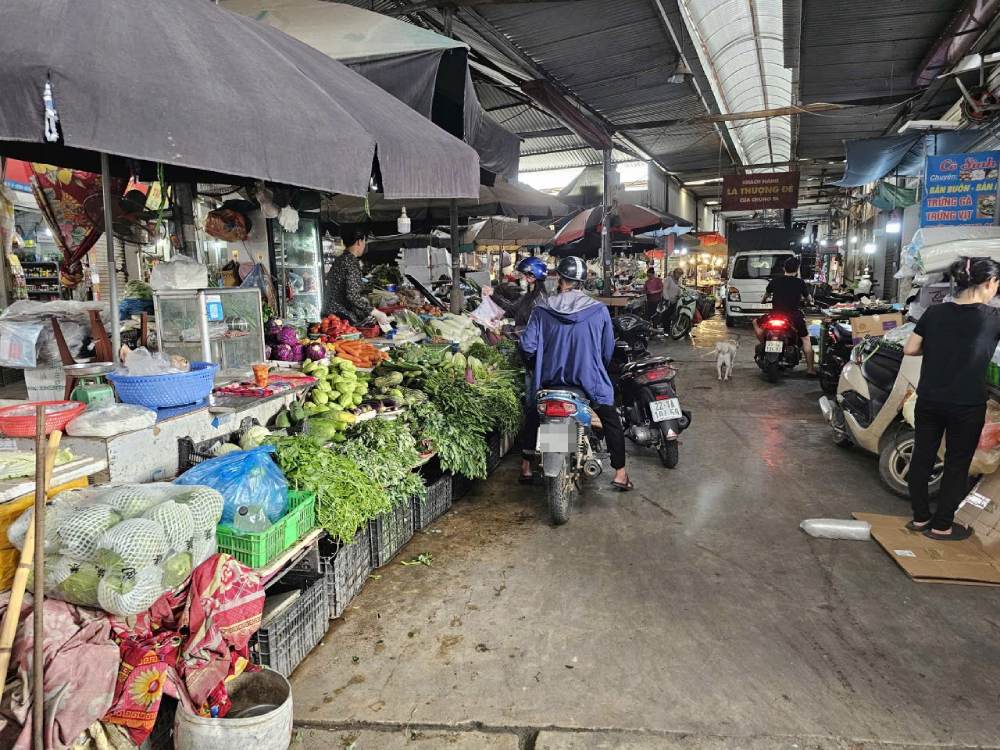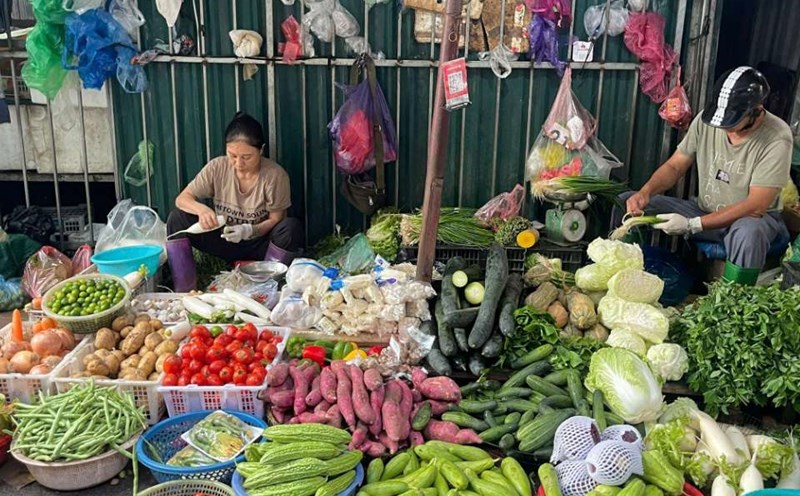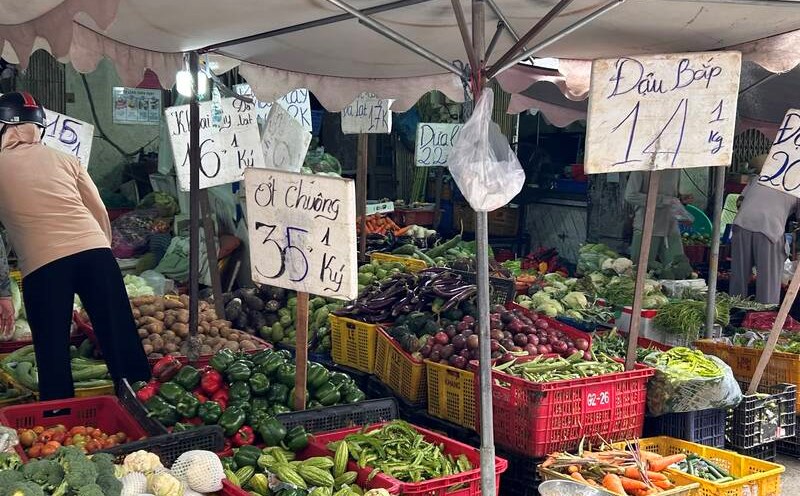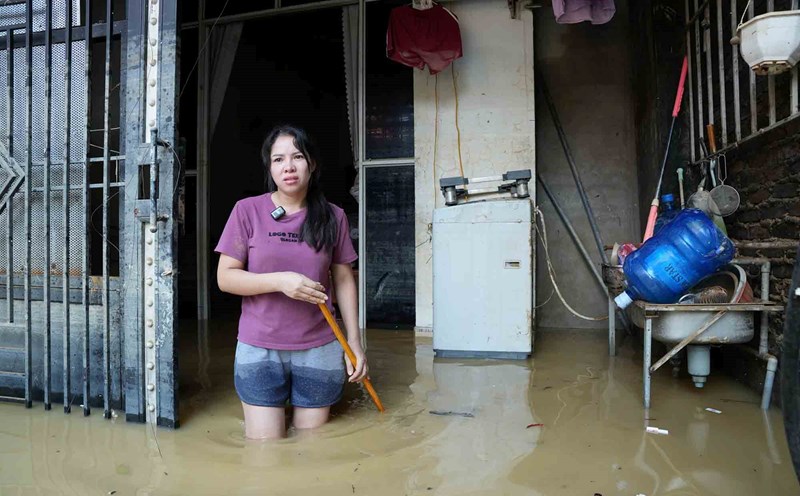Difficulty with the price of green vegetables
Ms. Nguyen Thuc Hien (residing in Nhue village, Thien Phuc commune, Hanoi City) said that every day she goes to the market at the f flea market at the beginning of the village to prepare for family meals. "After storm No. 11, I have been going to the market for the past few days to prepare family meals and have been "shocked" because the price of green vegetables has doubled compared to before," Ms. Hien said.
According to the female worker, she used to buy 8,00010,000 VND/bunch of Malabar spinach, now it has increased to 17,00018,000 VND/bunch. Water spinach also increased from 7,0008,000 VND to 14,00015,000 VND/bunch...
According to Ms. Hien, despite the high price, vegetables provide many important nutrients, especially for children, so she still has to buy vegetables for her daily meals. Ms. Hien spends 150,000-170,000 VND/meal, so when the price of vegetables doubled, she had to "balance" the other expenses.

Before, I bought 5 strings of pork/meal, now I only dare to buy 3.5-4 strings, then eat less fruit. I also buy less snacks for my children than before, the female worker shared.
Ms. Hien and her husband are both workers, and their income has not increased in the past while the cost of living has increased. "I earn more than 8 million VND/month, while my husband is a freelancer with an unstable income, while there are many things to spend, especially the education costs of my 2 children," Ms. Hien shared.
Ms. Ngoc Quyen - a worker renting a room in Nhue village - also lamented: "After the storm, the price of green vegetables doubled. Previously, the amount of Malabar spinach was only 5,0007,000 VND, now it is 20,000 VND. Malabar spinach from 8,000 VND to 15,000 VND.
"The day before, I went to the market to buy, the seller weighed half a small cabbage tree and quoted a price of 17,000 VND - the price that made me quite "shocked". Bitter melon prices also increased, buying 2 fruits for 9,000 VND; tomatoes, onions, mustard greens, herbs... all increased sharply. Now, buying pickles for 5,000 VND is like before, people didn't sell them, you have to buy them for 10,000 VND," Ms. Quyen shared
According to Ms. Quyen, all vegetables are doubled or even better, especially off-season vegetables. "It will probably be a year or two before farmers replant vegetables before prices stabilize. But now, going to the market every day is expensive" - Ms. Quyen shared.
Not only green vegetables, Ms. Quyen said that fruits are also expensive due to difficult transportation after the storm. Cucumbers and pears used to cost 20,000 - 25,000 VND/kg, now increased by 5,000 VND; pineapple from 17,00018,000 VND to 20,00023,000 VND/fruit. Only meat is kept in price or increased slightly" - Ms. Quyen shared.
Recalculate each meal
Income remains unchanged while food prices increase, causing Ms. Quyen and many workers to "calculate each meal", reduce spending and save more than before.
Mr. Tran Van Tung rents a room with 2 colleagues in Ha Dong ward, currently working as a worker in Yen Nghia Industrial Park. Mr. Tung said that he and his two friends cook dinner and lunch with the company.
"I often take on the job of going to the market, one person cooking rice, the other cleaning the house. I often buy vegetables and meat at a flea market near the boarding house. With 3 young men eating, the standard is about 130,000 VND/siveternum, I usually spend about 20,000 - 25,000 to buy vegetables, the rest is meat, beans, eggs... After 2 heavy rains caused by storms No. 10 and 11, I was really shocked by the increase in vegetable prices," said Mr. Tung.
According to Mr. Tung, with about 20,000 VND, he used to buy a batch of soup and a batch of stir-fried vegetables. Now with that amount of money, he was given a bunch of vegetables and a few flower stalls or a few chili by his regular vegetable seller. "A plate of food per meal must be up to 40,000 VND," said Mr. Tung.
Mr. Tung said that because the price of vegetables increased so much, everyone in his boarding house called home to ask their family to send vegetables from the countryside such as pumpkin, squash, potatoes, Brazil Brazil... to help reduce some costs.
The girls tried their best to call home to ask them to send vegetables and then go to the bus station to receive them, but we were lazy and busy going to work, late from work. I just hope that vegetables in areas that are not flooded will be brought to the capital soon to reduce heat and reduce the spending of workers like us. Now, eating vegetables is also easy...", Mr. Tung shared.











